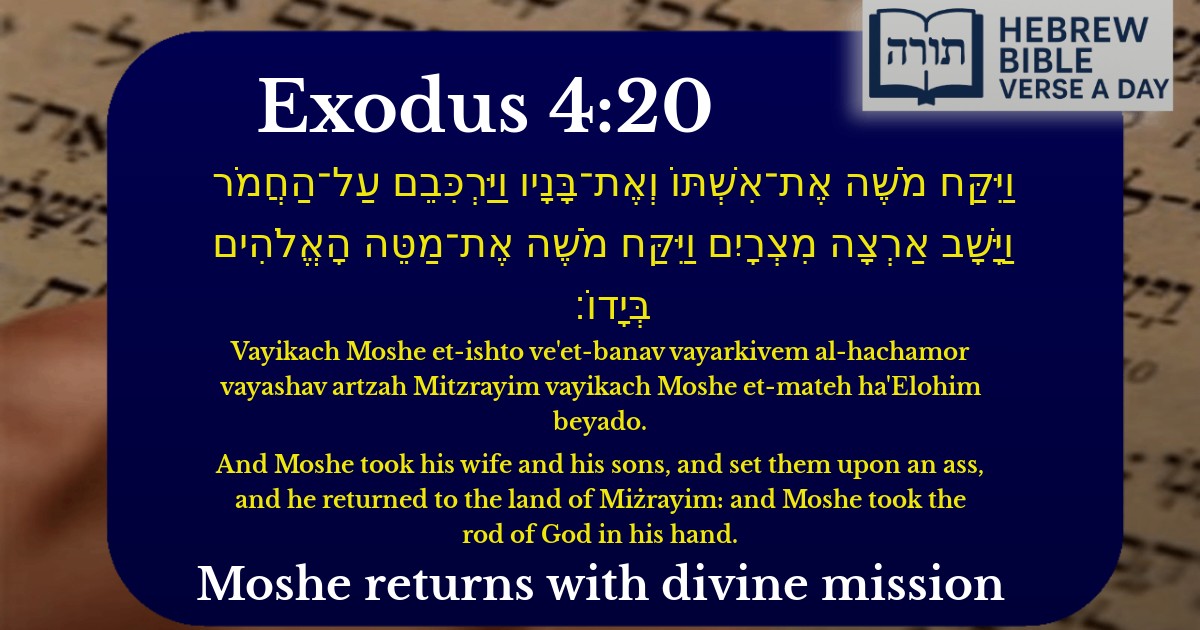Join Our Newsletter To Be Informed When New Videos Are Posted
Join the thousands of fellow Studends who rely on our videos to learn how to read the bible in Hebrew for free!
Hebrew Text
וַיִּקַּח מֹשֶׁה אֶת־אִשְׁתּוֹ וְאֶת־בָּנָיו וַיַּרְכִּבֵם עַל־הַחֲמֹר וַיָּשָׁב אַרְצָה מִצְרָיִם וַיִּקַּח מֹשֶׁה אֶת־מַטֵּה הָאֱלֹהִים בְּיָדוֹ׃
English Translation
And Moshe took his wife and his sons, and set them upon an ass, and he returned to the land of Miżrayim: and Moshe took the rod of God in his hand.
Transliteration
Vayikach Moshe et-ishto ve'et-banav vayarkivem al-hachamor vayashav artzah Mitzrayim vayikach Moshe et-mateh ha'Elohim beyado.
Hebrew Leining Text
וַיִּקַּ֨ח מֹשֶׁ֜ה אֶת־אִשְׁתּ֣וֹ וְאֶת־בָּנָ֗יו וַיַּרְכִּבֵם֙ עַֽל־הַחֲמֹ֔ר וַיָּ֖שׇׁב אַ֣רְצָה מִצְרָ֑יִם וַיִּקַּ֥ח מֹשֶׁ֛ה אֶת־מַטֵּ֥ה הָאֱלֹהִ֖ים בְּיָדֽוֹ׃
וַיִּקַּ֨ח מֹשֶׁ֜ה אֶת־אִשְׁתּ֣וֹ וְאֶת־בָּנָ֗יו וַיַּרְכִּבֵם֙ עַֽל־הַחֲמֹ֔ר וַיָּ֖שׇׁב אַ֣רְצָה מִצְרָ֑יִם וַיִּקַּ֥ח מֹשֶׁ֛ה אֶת־מַטֵּ֥ה הָאֱלֹהִ֖ים בְּיָדֽוֹ׃
🎵 Listen to leining
Parasha Commentary
📚 Talmud Citations
This verse is not quoted in the Talmud.


Moses' Return to Egypt
The verse describes Moses taking his family and returning to Egypt with the rod of God in his hand. This moment is significant as it marks the beginning of his mission to liberate the Israelites from slavery.
The Significance of the Donkey
Rashi (Shemot 4:20) explains that the donkey mentioned here is no ordinary animal—it is the same donkey that Abraham saddled for the Akeidah (Binding of Isaac) and the same one upon which the Messiah will one day ride (as referenced in Zechariah 9:9). This connection highlights the divine providence in Moses' mission, linking it to the covenant with Abraham and the future redemption.
The Rod of God
The "rod of God" (מַטֵּה הָאֱלֹהִים) is identified by the Midrash (Shemot Rabbah 8:3) as the same staff used by God during Creation, later passed down through generations until Moses received it. Rambam (Moreh Nevuchim 1:66) suggests that the rod symbolizes divine authority, demonstrating that Moses' power came directly from Hashem.
Moses' Family in the Narrative
The inclusion of Moses' wife and sons (Tzipporah, Gershom, and Eliezer) underscores his commitment to both his mission and his household. The Midrash (Shemot Rabbah 4:4) notes that Tzipporah played a crucial role in saving Moses' life earlier (Shemot 4:24-26), and her presence here signifies divine protection over the family as they embark on this perilous journey.